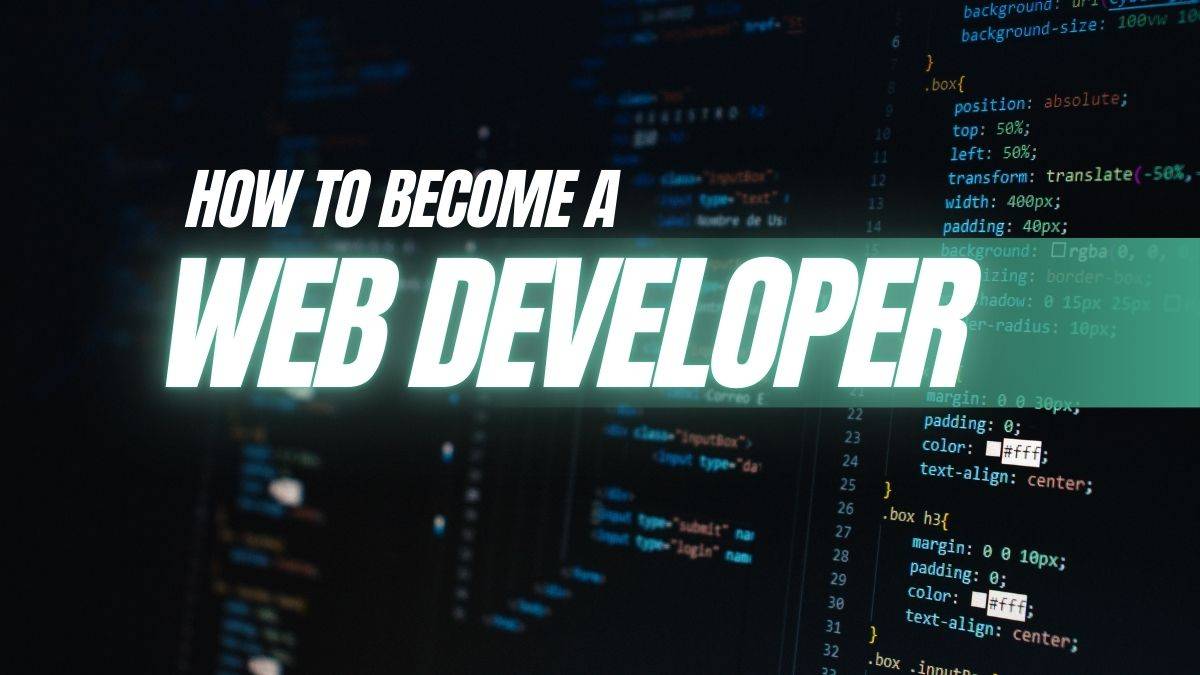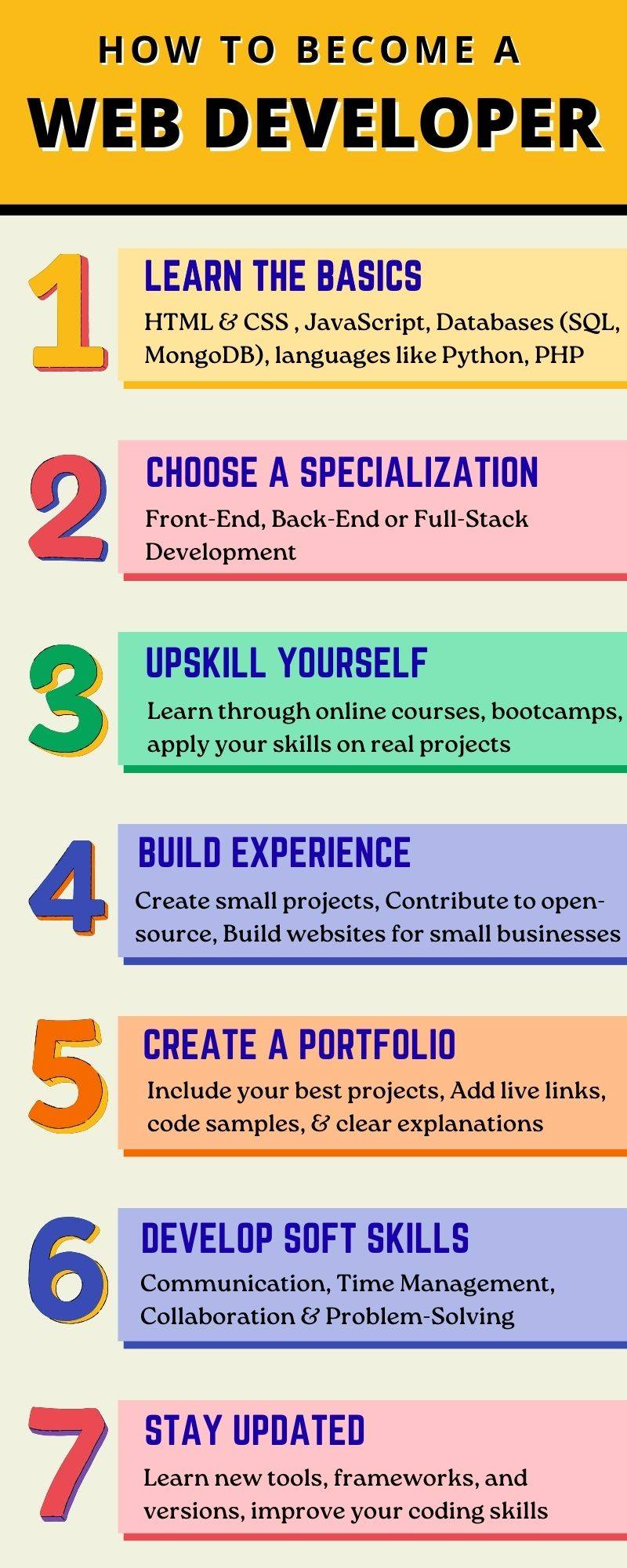How to Become a Web Developer: Explore Top Skills, Resources, Step-by-Step Guide
If you love technology and puzzles and want to build something that millions of people can use, web development is the career for you. The best part? You do not necessarily need to get a fixed degree before you become a web developer-the right skills, the right projects, and a portfolio can give you a great head start. Another interesting fact that, according to the U.S. Bureau of Labor Statistics (BLS), overall employment for web developers will increase by 16% in 2022 - 2032. In this blog, we have covered in detail how to become a web developer.
- What is a Web Developer?
- What is the Role of a Web Developer?
- Step-by-Step Guide to Becoming a Web Developer
- Best Web Development Learning Resources
- What Skills are Required to Become a Web Developer?
- Web Developer Jobs & Salaries
What is a Web Developer?
A web developer or programmer is a professional who translates web design into a language that a computer understands, such as Python or HTML. Web development is done by writing lines and code, using a range of languages.
There are mainly four profiles for web developers, which include –
- Front-end developers: They add all the visual elements that users see and interact with in a web application.
- Back-end developers: Responsible for building, programming, and optimising the server, server-side applications, and the database. They connect these to the front-end code to deliver a smooth, working experience for the end-user.
- JavaScript Developers: They develop, improve, and make changes to websites; they are generally front-end developers.
- Full-stack developers: They deal with different languages and databases like PHP, HTML, CSS, JavaScript, and others.
What is the Role of a Web Developer?
A web developer’s job responsibilities include making their client's vision a reality. They are responsible for building a range of websites, including e-commerce, news, and gaming sites, to fit clients' needs. A web developer’s roles and responsibilities include -
- To write well-designed, testable and efficient code by following the best practices of software development.
- To create a website layout/user interface following standard HTML/CSS practices.
- To integrate data from several back-end services and databases
- To collect and refine specifications and requirements according to the customer's needs.
- To create and maintain software documentation
- To maintain, extend, and scale the websites
- To stay plugged into emerging technologies/industry trends and apply them to operations and activities.
- To meet with clients or management to discuss the needs and design of the website
- To match visual design intent by cooperating with web designers.
- To create and test applications for a website
- To write code for the website, using programming languages such as HTML & CSS or XML.
- To integrate graphics, audio, and video into the website

Step-by-Step Guide to Becoming a Web Developer
There is no set career path to becoming a web developer. However, some steps are generic. The process basically involves gaining technical know-how, project exposure, and a portfolio that showcases your capability. Following are some of the basic steps you will need to follow to begin in this career:
- Learn the Basics
Begin with basic web technologies, including:
- HTML & CSS – for website structure and presentation.
- JavaScript – for interactivity addition.
- Databases – such as SQL or MongoDB, to manage data.
- Optional Languages – such as Python or PHP, based on your interest.
- Focus on Specialisations
Choose if you wish to concentrate on:
- Front-End Development (user interface)
- Back-End Development (server, databases)
- Full-Stack Development (front-end as well as back-end)
- Obtain Training
You may learn from online tutorials, boot camps or college degrees. Practice and being in a position to apply concepts to real projects are most crucial. You can take some online web development courses, like –
- Certificate in Web Development Python Training
- Certificate in Full Stack Web Development
- Full Stack Web Developer - MEAN Stack
- Graphics, Web Design and Development
- Diploma in Web and Mobile App Development
- Develop Experience
Work on minor projects, open-source projects, or helping small companies in building websites. This develops practical experience and problem-solving skills.
- Create a Portfolio
A good portfolio of your best work speaks more than any certificate. Include live projects, code snippets, and clearly describe your role.
- Acquire Soft Skills
Good communication, teamwork, and time management are necessary, especially if you freelance or work remotely.
- Stay Up to Date
Technology evolves quickly. Consistently learn new tools, frameworks, and best practices.
Best Web Development Learning Resources
Ready to try web development for yourself? We've compiled more than a dozen great resources to get you started. Whether you decide to teach yourself or learn online, this is the place to start. And for those in college, they're great complements to your courses.
1. Stack Overflow
The first rule to being a developer is using Stack Overflow. Every developer knows they have to head over to Stack Overflow whenever they become stuck on a project. If your question hasn't already been asked and answered, the community of seasoned professionals is ready to help.
2. Codecademy
If you are looking for a beginner's course in more than a dozen languages and technologies, then Codecademy is your destination. Even better, most of the content is free. There are premium features, but the courses themselves are completely free.
3. GitHub Learning Lab
If you are not used to technical things, then Git is very hard to learn. It is simple once you know how it works, but getting over that initial barrier is not that easy. The GitHub Learning Lab takes you on an easy, fun, and interactive tutorial.
4. DevKinsta
Want to learn WordPress development? Start at DevKinsta. It's a free development environment that makes it easy to get started on a local WordPress server. Test and develop with it, then deploy the finished product to a Kinsta server.
5. FreeCodeCamp
Want to learn to code and earn a certificate while you're at it? Unlike Codecademy, FreeCodeCamp is 100% free because it's a non-profit organisation. Each certification path is estimated to take about 300 hours, and you can choose from a variety of different skills to learn.
6. Egghead.io
Egghead has helpful, bite-sized tutorials on all kinds of development subjects. There are dozens of subjects to pick from, and each one has dozens more articles about all sorts of development topics you could dream of. You can even find classes from professional teachers.
7. Coding Bootcamp Programs
If you learn best in immersive, data-dense programs, think about coding bootcamps. They range from beginner to advanced: there are even beginner coding bootcamps that will get you started, as well as professional programs that will keep you up to date.
What Skills are Required to Become a Web Developer?
The most important web developer skills include -
- Creativity and analytical thinking
- Fluency in JavaScript, SQL, PHP, HTML, XML and CSS
- Good working knowledge of web designer packages such as Adobe Photoshop, Dreamweaver, Fireworks, and/or Flash.
- Proficiency in multiple operating systems and mobile platforms, such as Android and iOS.
- An eye for detail and an ability to build visually-appealing websites
- Excellent communication and visual presentation skills
- Ability to work independently or with limited supervision
- Have an idea of search engine optimization (SEO), marketing, and social media
- Awareness of international web standards and protocols, technology, and software development
- Ability to comprehend and explain technical matters clearly
- Ability to withstand work pressure and work under tight deadlines
Web Developer Jobs & Salaries
Check out the top job roles that a web developer can pursue during the span of his/her career. To explain it in a better way, we have added web developer salaries -
| Role |
Level |
Description |
Salary |
| Junior Web Developer |
Entry-level |
Completes basic coding assignments, debugs bugs, and assists senior developers. |
INR 1.0 - 5.0 LPA |
| Web Developer |
Mid-level |
Develops user interfaces, works with databases, or does both ends of development. |
INR 1.0 - 7.7 LPA |
| Front-End Developer |
Mid-level |
Specialises in the user-facing aspects of a website or application |
INR 1.5 - 12.0 LPA |
| Back-End Developer |
Mid-level |
Deals with the server side, databases, application logic, and infrastructure. |
INR 1.8 - 18.0 LPA |
| UI/UX Developer |
Mid-level |
Creates user-centred and visually appealing web designs. |
INR 2.0 - 14.9 LPA |
| Full-Stack Developer |
Mid-level |
Handles both front-end (client-side) and back-end (server-side) development. |
INR 1.8 - 17.0 LPA |
| Senior Web Developer |
Experienced |
Responsible for complex projects management, code review, and mentoring of junior developers. |
INR 3.0 - 17.4 LPA |
| Lead Web Developer |
Advanced |
Responsible for managing a team of developers, allocating tasks, and ensuring project delivery. |
INR 4.8 - 32.0 LPA |
| Software Architect |
Advanced |
Responsible for designing the overall system structure, choosing tools and frameworks. |
INR 16.1 - 59.0 LPA |
| Engineering Manager |
Leadership |
Manages more than one team, maintains timelines, and synchronizes development with business objectives. |
INR 12.0 - 75.0 LPA |
| CTO (Chief Technology Officer) |
Top-level |
Drives and leads the company's tech vision, strategy, and innovation. |
INR 15.0 - 101.0 LPA |
Salary Source: AmbitionBox (September 2025)

 Call 8585951111
Call 8585951111



Rashmi Karan is a writer and editor with more than 15 years of exp., focusing on educational content. Her expertise is IT & Software domain. She also creates articles on trending tech like data science,